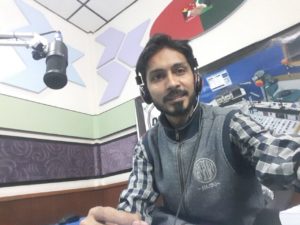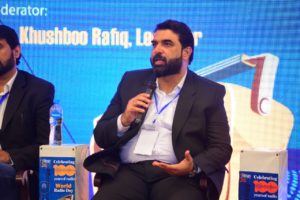World Radio Day: What's in store for radio broadcasters?
- By Hunain Ameen -
- Feb 13, 2021

“TV gives everyone an image, but radio gives birth to a million images in a million brains,” is the quote that captures till date the essence of the audio transmission, even after the century of its inception and its having braved all the ‘perfect storms’ that rose and impeded its survival.
UNESCO earmarked the 10th World Radio Day today (February 13) three sub-themes that are Evolution, Innovation, and Connection -as the medium hasn’t only survived but has in fact resiliently flourished by adapting to changing global demands and with its growing accessibility, has effortlessly helped masses connect.
In the local backdrop, with over 200 commercial and non-commercial radio stations operating across the country as we speak, extending coverage to the longitude and latitude of Pakistan, the broadcasters and social science academics have observed WRD no less.

Sharing her personal account one Noreen Shams, an erstwhile broadcaster for local Apnakarachi FM 107, suggests, “Radio is cost-effective,” expanding that even in times of global crises when the primary mass sources for news and information, television and newspapers, had to capitulate, “radio broadcasts for far-flung areas have been resilient”.
Only medium in the advanced history that has worked well in times of crises, including amidst the global pandemic that plagued the globe since early 2020, morning drive-time host Shams said.
But there’s more to and on the radio today than just charisma and glamour. While it nevertheless relays the narratives specific to the people where it belongs, as Shams instantiates, “When laymen shared their take on political vicissitudes, I felt connected and evermore educated on the grassroots level,” the medium has its own vicissitudes to deal with as well.
Sibte Hassan, a Karachi-based journalist covering health and education beats, says Radio today with its lackluster broadcast needs a radical overhaul, both in terms of content management and content creation, if it should survive for long.
Currently associated with local TV, Hassan draws a stark contrast as he began his career as a presenter on FM 107 and spent good reportage years as a sweet yet faceless voice.

With no stability and bleak future prospects for broadcasters, Hassan thinks it’s almost unrealistic to hope there will be new talent emerging from radio like how it used to be.
Radio has been unquestionably a one-stop-shop for broadcasters and a hatchery that has produced a great many media connoisseurs since its inception but this comes at a cost.
“Erudition in radio, while necessary, is scarce today because it incurs expenses,” Hassan says while he supports his assertion with the fact that even in commercial radio stations across Pakistan, you can hardly make Rs2000 for an hour.
You don’t expect the content quality that can shoulder radio’s past glory when you’re reluctant to spare the due expense, he regrets.
On the other hand, it cannot be ignored that universities are still rolling out new batches of media graduates even as the opportunities for them shrink and media tycoons bemoan the financial crunch as they lay off abundantly.
As in-charge of an academic station FM 96.6 Mushtaq Muhammad spares no effort in telling it like it is. “Radio has been reduced to a hobby than an occupation now.”
However, as an academic, he still believes, marking the importance of radio in any civilized and cultured society, that if you must establish a benchmark dialect of any region or regional language, listen to their radio station.
Muhammad trains young broadcasting enthusiasts at Sindh Madressatul Islam University and is of the view that Radio equips you with both, what to write and how to present it.

“A newspaper journalist will know how to write well, and a TV presenter would know how to say things that leave an impression or at least get the message across,” he says and furthers that with radio, where the voice is the only product, the broadcaster requires a diversity of expertise.
“You need choicest words, skill to speak them rightly, and the capacity to adapt to daily trends to keep your audience response alive.”
As much as I’d recommend young artists, looking forward to becoming multimedia journalists, to train in radio stations, I have an obligation to be realistic enough to not paint for them a picture whose gloom hides behind its glitter, Mushtaq wails.
He argues that the problem lies with the stations’ race to give in to the whimsical societal trends that change daily, instead of establishing a niche.
You can be a sports station; a traffic station; a current affairs station; an academic one debating new ideas and technologies; or even a local community station dealing with a specified radius, so people will know where to turn to when they seek a particular commentary, Muhammad suggests, adding “…but when you join the race of maintaining an audience footfall, bothered by daily and arbitrary numbers, you leave yourself vulnerable to redundancy.”
Although, with all said and done, let’s be mindful that UNESCO has pledged towards the growth, adaptation, and accessibility of radio so it continues to evolve and keeps the world connected.
